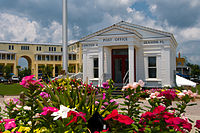
Photo from wikipedia
This paper considers the landscape as both a material and an ideological representation and starts from the assumption that spatial patterns arise as a result of the ideological imperative of… Click to show full abstract
This paper considers the landscape as both a material and an ideological representation and starts from the assumption that spatial patterns arise as a result of the ideological imperative of the process that forms the landscape. The research takes on a historical-interpretative approach in the domain of architectural and urban studies, enabling in-depth qualitative exploration of the textuality and layering of the modernist rural landscape through a case study of the PKB Agricultural Combine as a driver of the urban development of Third Belgrade, the spatial framework of the left riverbank of the Danube in the administrative area of Belgrade. The research was conducted by chronologically interpreting primary sources, notably planning documents of different levels and scope, as well as studies, programs and development models for the urbanization of this territory. The research aims to decode the impact of socialist agrarian policy on the land-use in the wider metropolitan area of Belgrade, as well as the impact of the agricultural combine as a spatial, social, economic, environmental and political entity on the urban development process at different spatial levels. The research has identified four periods in the development of Third Belgrade: (1) Production of the Modernist Rural Landscape, (2) Establishment of the Self-Management Planning Framework, (3) Humanization of Environment, and (4) Post-socialist Transition and the Collapse of the Agricultural Combine. The paper demonstrates not only that environmental transformation cannot be separated from social transformation but also that they are in constant interaction and that their synergy has had a profound impact on the development of the PKB Agricultural Combine system in socialist conditions. The textuality of the modernist rural landscape confirms that an object-oriented approach is not enough to explore and interpret the landscape, but rather, we should look at the way it is socially produced through decoding the planning, institutional and policy frameworks determining the urban development of a territory.
Journal Title: Land
Year Published: 2020
Link to full text (if available)
Share on Social Media: Sign Up to like & get
recommendations!